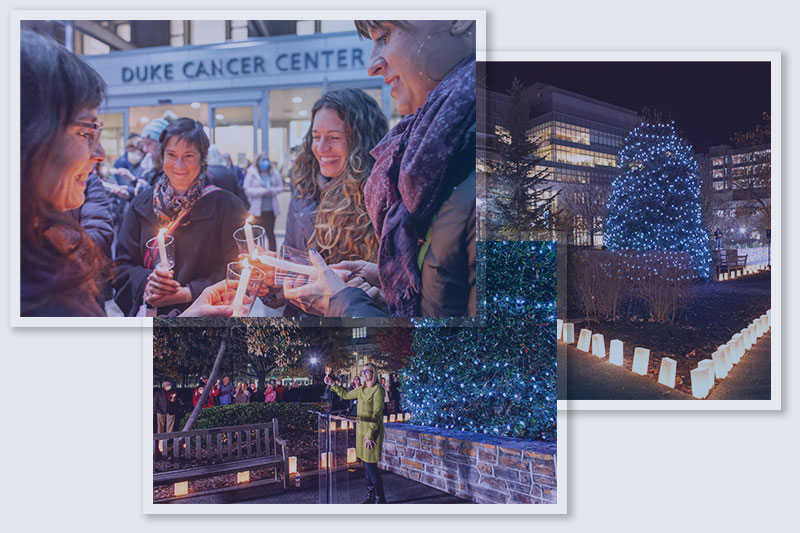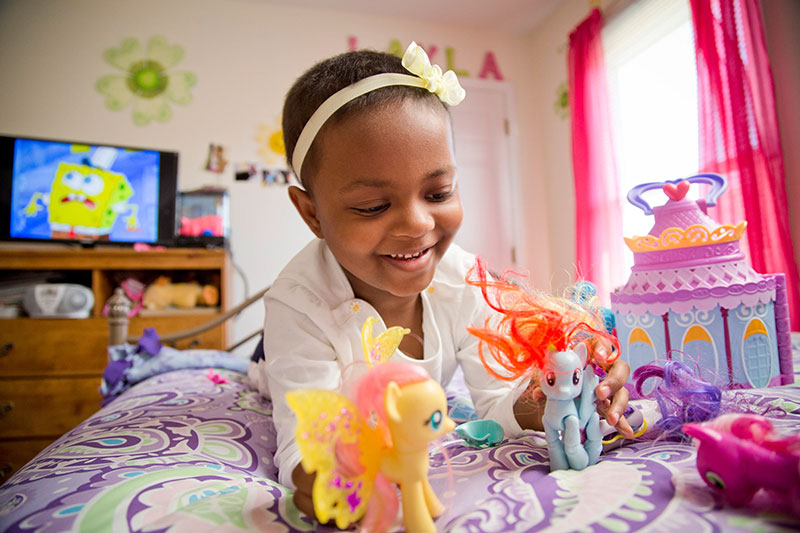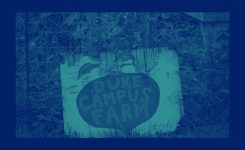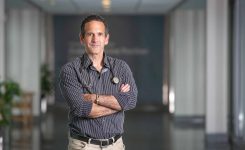Features, Health, Medicine
The Many Faces of Cancer
The Many Faces of Cancer
The Many Faces of Cancer portrait series captures the powerful stories of individuals navigating the cancer experience — each in their own way. We are humbled by their resilience in the face of adversity and we are honored that they entrusted Duke Cancer Institute with their care. The portraits are hung at the 1st floor entrance to Duke Cancer Center to serve as a source of comfort, empowerment, and a celebration of the individual's strength.
Angela Brock
Clayton, NC
Angela was diagnosed with Stage III colon cancer in 2020. She found a network of support at Duke and encourages those who have not, to utilize cancer support services, such as medical family therapy. But Angela’s faith in God has helped her the most. Here, Angela worships at Duke Chapel.
Audio Transcript
From the very beginning when I was in the hospital and the doctor came in beside my bed and he looked at me and said, “Miss Brock, I hate to tell you but you have cancer.” And I'm thinking to myself, “Oh my God.” And then, oh my gosh, they just started throwing stuff at me you know chemo, this care that care, this doctor, that doctor, date... You know they finally told me all the bad news that they could handle to tell me right and then they walked out of the room. And I remember saying, “So well Jesus, it's just me and you now. It's just me and you.” And so all the things that I can go through are nothing compared to what he went through just to give us a second chance at life. And so when you take all of that into your heart and you meditate that and you feel that you believe that. I just walk in my blessings. I don't even think about it. Sometimes people have to remind me that I had cancer. And you know what I'm saying they have to remind me of that because I'm just going on and on. I refuse to let cancer dominate me. I just, I just can't, I can't do that. I can't let anything dominate me because I know if we concentrating on the things that make us feel good, then we don't have time to give any way or any leave to things that make us feel bad. Because you're going to feel bad but if you try to concentrate on the good, then you're going to uplift yourself and then you're going to uplift others. So that's what I want. I just want to uplift somebody else. If I can make somebody else feel good because there's an answer in the Bible for everything that you could possibly be going through so.
“There is hope, don’t always look at your situation as ‘this is the end.’ Nobody knows the end story but you and Christ.”
Matt Cross, 39
Raleigh, NC
Matt was diagnosed with stage 2B testicular cancer in 2019. Driven by a new sense of purpose after his battle with cancer, Matt established the Raleigh Testicular Cancer Foundation to create a community of support for men ages 15 to 35. Here, on the Duke Cancer Center campus, Matt plays with his three-year old dog Rocky beneath an oak tree he donated as a living tribute to his foundation (their tagline is Check Your Acorns).
Audio Transcript
For me I was very lucky. Testicular cancer allowed me an opportunity to view the world through a different lens. A lens filled with gratitude. A lens that allows me to see more joy. I look at my cancer experience as something that made me more wise, more mature, more put together. So, I look at it as a blessing, actually. Breaking the stigma associated with testicular cancer, a cancer that affects a private part for a man, comes with a lot of emotional stress um a lot of guilt, a lot of shame. I would suggest you focus on the things that you can control. Try to burn off the rest. Give yourself Grace. Rest when needed. Accept the help that other people want to give around you. Cancer is not easy but through your suffering you can find a lot of positive things and a lot of growth. Obviously, there is a stigma associated with mental health, specifically men's mental health, so the Raleigh testicular cancer Foundation has a mission of raising education awareness about testicular cancer but also addressing the stigma associated with Men's Health. We're creating a community with the shared experience of testicular cancer and we get to support men that have been diagnosed with cancer. That can look like a peer support group, that can look like a weekly phone call, a breakfast, a lunch. So those psychosocial needs, actually, I believe are almost more important than the physical needs for testicular cancer specifically.
“Focus on the things you can control, try to burn off the rest, and give yourself grace when needed. Accept the help that other people want to give around you. Cancer is not easy, but through your suffering, you can find a lot of positive things and a lot of growth.”
Jacqueline Weatherly, 61
Raleigh, NC
Diagnosed in 2021, Jacqueline is currently in remission from multiple myeloma. Jacqueline credits her doctors for healing her body and the Duke Cancer Patient Support Program for healing her mind. Here, she basks in a snowfall of petals while strolling through Duke Gardens’ Cherry Allée.
Audio Transcript
Cancer has changed the perspective on life for me because the things that used to bother me they no longer bother me. So, that's a plus in itself. Well, there's not just one piece of advice that I would share. But I would definitely tell them to stay on your knees, stay in prayer, stay positive and please please get counseling. Not just for you, but for your caregivers as well. Counseling helps you keep everything in perspective it has sustained me honestly. I would recommend that those who are struggling with their cancer journey seek counseling as soon as possible.
“One piece of advice that I would share is to stay on your knees in prayer, stay positive, and please get counseling. Not just for you, but for your caregivers as well.”
Nicholas Melomo, 18
Raleigh, NC
Nicholas was diagnosed with osteosarcoma in 2020. He found support with the DCI Teen and Young Adult Oncology Program during chemo treatments, leg amputation, and numerous surgeries. Here, he plays with his Star Wars Lego sets in his space-themed bedroom. Nicholas passed away on Oct. 29, 2023, embraced by the love of his family.
Audio Transcript
I'm still pretty introverted but I used to be way way way more introverted before I was diagnosed. Since then I have been a lot more, like trying out new things, going different places, talking to more people, spending time with friends more. Just really like not worrying about little things as much anymore as I used to because I realized that anytime something horrible could happen like what happened with me and so it's best instead of worrying about these things to just do what we can to make sure we're enjoying ourselves and living our best life. I'd say don't be afraid to tell your friends about what's going on with you, first of all. I think it's just super important to be clear with them, to let them know what's going on and let them know what does help what doesn't help. Inform them, friends and family, and I know it's easy to get afraid, but know that there are millions of people who are dealing with very similar thing to you and there are also millions of people doing everything they can in their power to make sure that you're going to be okay—and that millions and millions of people are there for you whether you know it or not.
“I realized that at any time something horrible could happen like what happened to me. It’s best instead of worrying about these things to just do what we can to make sure we’re enjoying ourselves and living our best life.”
Raquel Ferreyra, 53
Willow Springs, NC
Raquel was diagnosed with stage 3 endometrial cancer in April 2023. Through Duke Cancer Patient Support Program’s Child and Adolescent Life services, she found the help she needed for her children while undergoing six sessions of chemotherapy and six weeks of daily radiation. On a recent visit, her doctors found no evidence of cancer. Here, Raquel enjoys time with her kids, Victoria, 18, Amelia, 16, and Mateo, 14.
Audio Transcript
When I got the news, I didn't think about myself or what I was going to go through. My first thought was, “Oh, my kids...” They were my goal. It's like, I'm going to get out of this because, because of them, because I went through so much to have my kids. I couldn't have kids and I felt like I can't leave them now. Cancer made the four of us super strong. When I would be here in bed, I could hear the three of them downstairs interacting, helping one another, cooking and doing the things and it's like, I was so thankful that they were there for one another. I felt like I had done something good raising them because they knew that, they know what family means. I'm thankful for what I have.
“When I got the news, I didn’t think about myself or what I was going to go through. My first thought was, ‘Oh, my kids.’ They were my goal. I’m going to get out of this because of them. Cancer made the four of us super strong.”
Clifford Chieffo, 86,
Patricia Chieffo, 86,
and Nina Chieffo, 55
Cary, NC
Clifford was diagnosed in 2017 with a rare form of pancreatic cancer and now is disease free. His wife Patricia was diagnosed in 1999 with breast cancer and then metastatic breast cancer in 2010, on the same day that her daughter Nina was with breast cancer. Nina is now cancer free. The lifelong art lovers enjoy a winter afternoon together here at the North Carolina Museum of Art in Raleigh.
Audio Transcript
Clifford: Confronting cancer is an odd, threatening, and scary thing for each of us. But, I maintained a level playing field by not anticipating the future but, rather, forming a team with the great doctors at Duke and then with family and friends and from there, we just take what comes and deal with it. It has a lot to do with not abstract hope but more positive science hope.
Pat: But we've been doing this together as a family and that's the most important of all. We support each other, we love each other so much but that's what we are, we're we're a family. So, as we say we hug together and we fit—we're both right sided with mastectomies—like a puzzle.
Nina: It's changed my perspective on life. I realize the importance in really small things that I may have overlooked in the past— being with family, being with my pets and those who I love and even being excited when springtime comes and the and the leaves are starting to bud. And you know, I don't think I noticed those things quite as clearly as I do now.
Pat: I never thought in my lifetime that I would ever get cancer but it makes me I think more appreciative of my friends, my family, of course the most, but my friends when they get breast cancer or they're worried, they know they can call me. I've become more dependable. I've become a real friend and that's so important to me and that my friends would call and trust me.
Clifford: And what I found was that it was something I never would have expected but at the same time I learned to try to stay calm and take it a piece at a time. And, so far, that has worked wonderfully for me. So, for all those new folks, stay calm link up with the family and you know take it a day at a time.
“Confronting cancer is an odd, threatening, and scary thing for each of us. But we maintained a level playing field by not anticipating the future but rather forming a team with the great doctors at Duke, cancer support staff, and then with family and friends. From there we just take what comes and deal with it.”
-Clifford Chieffo
Ovester Grays, 67
Durham, NC
Ovester was diagnosed with lymphoma in 2019. As the long-time girls’ basketball coach at Hillside High School, Ovester focuses on imparting life’s lessons rather than x’s and o’s. Still cancer-free, he takes a break from practice here with his students.
Audio Transcript
No matter what life does, no matter what man does, my mind and soul will stick to what keeps me strong and that's my faith and belief that there's too much good in this world. Because you got a choice every day, stay in the dark space or stay in the light. Right, well what it changed was it increased my growth as far as my life and purpose. In my mind we live we learn and we grow and different trials, in this case, cancer, was a great trial so I thought, my growth from and awareness of my purpose became so much clearer. In one hand, having great hope but on the other hand, taking one day at a time and appreciating one day that God gives me. With that came the ability for me to focus on those positives in life and not so much on on the challenges that life brings sometimes. Which they keep coming and they're still there but my I'm able to refocus on the positive much better than I was prior to. Basketball is kind of like a metaphor for the thing I'm speaking about. In a game, a lot goes well, some things don't go your way and you don't have a chance to sit around and pout about it and worry about it. You have to think right, what's next, what do I do next to improve my situation. So, in the court itself I'm able to help my young people draw a parallel between the two and of course off the court using those same lessons in how they deal with their challenges. Whether it's surgeries, injuries, grades, whatever the challenges they're having, helping them learn how to use their mind power and hope to focus on what they can do. What they are in control of to improve their lives and not allow so many negatives. Especially nowadays. Anxiety, despair, depression, frustration, seep in and rule their actions. It's really important they focus on, “what I got to do,” to move past that so that my quality of life is a better one mentally and emotionally, which I believe helps him physically.
“No matter what life does, no matter what man does, my mind and soul will stick to what keeps me strong. And that’s my faith and belief that there’s too much good in this world… You’ve got a choice everyday: stay in the dark space or stay in the light.”
Tree of Hope Ceremony

Tree of Hope Lighting Ceremony will be held this Thursday, December 7 at the Duke Cancer Center from 5:30 to 6:30 p.m. To learn more and to register for the in-person or virtual event, visit DCI-TreeOfHope.com.
The Many Faces of Cancer (2017)

Look back at the original series of photographs that were on display at the Level 1 entrance of the Duke Cancer Center, in the concourse between Duke Clinic and Duke Medicine Pavilion.
This is the second installment of images and narratives by photographer Jared Lazarus. First launched in 2017, the Many Faces of Cancer project is brought to you by DCI’s Supportive Care and Survivorship Center in collaboration with Duke University Communications & Marketing.








